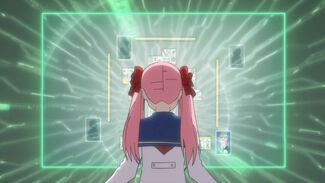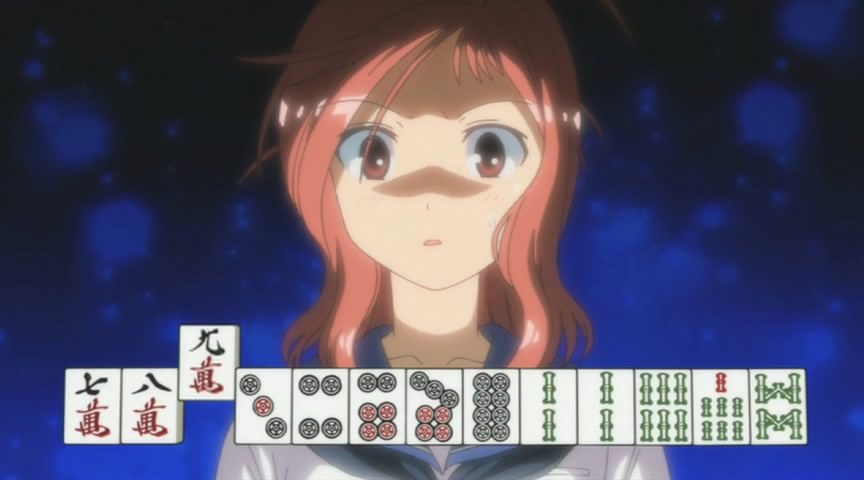Ever heard of Myers-Briggs? It's a personality test that determines a general archetype of your personality, categorized into four distinct parts that ultimately creates 16 different molds of human character, each with varying degrees of intensity. These different categories reflect the choices you as a person will tend to make in your everyday lives - and that naturally includes playing trading card games. In fact, I can generally tell what kind of character a person has based on the deck they choose to run and the way they run that deck.
 |
| Be prepared for a lot of Saki references... |
Please keep in mind that these are just generalizations and you do not have to conform entirely to a certain mold to be able to be classified by the mold. We're talking about a spectrum of players here, and I'm just discussing the extreme ends. More than likely, you'll fall into some middling range between the two (like 80/20 Digital, which is where I'm at).
Digital Players
are players who calculate everything. The world is full of numbers and equations, and in their minds is a set of LED displays that list out a variety of values. The number of cards in deck. The ratio of monsters to spells to items to impacts. The ratios of Size 1 to Size 2 to Size 3. They use numbers to get a logical foothold on any situation, taking very calculated measures of play. Odds and percentages are very important, and 50% is the golden line - if I have more than a 50% of gaining, then the risk is worth it. |
| Brain too strong, please nerf |
Digital players care a lot about numbers and what they mean. They rationalize through everything and choose the best-case-scenario every time. A digital player often sees a cardgame from a grand-perspective, meaning the entire game as a whole. A deck is taken in the context of the values it contains and not the performance of a few games. Digital players understand that a thousand games may not be enough to truly determine whether something works well or doesn't. Digital players have one set playstyle that they rarely deviate from because it works.
 |
| Nodoka: Impossible! Me: Not in anime... |
Occult Players
on the other hand, have a touchy-feely approach. There's a lot that can't be measured or understood, and occult players have a sense that some things just have to be felt out. Instead of their brains, they use their guts. Sensitive to the slightest change in situation, occult players notice small things and take them as signs or indicators of other things. Most importantly, they do whatever feels right, not necessarily needing an explanation. If it works, it works. |
| It's always a sign |
As much as most occult players hate to admit, they do believe in the heart of the cards. Topdeck is legit and fate is real. Occult players also take any chance they can. If there's even a remote possibility it will work, an occult player will flirt with the idea. They have a case-by-case, game-by-game perspective that is heavily influenced by emotion, instinct, and coincidence. They highly value the results of every single game. Occult players also tend to stick to one playstyle, but this one playstyle is often different for each deck or game.
 |
| Dumbest. Idiot. Ever. |
Which side is better?
Ahahaha. Don't make me answer this.
As with most binary comparisons, there are advantages and disadvantages to both sides. Digital players, on average, tend to be smarter and better educated. Decks and strategies that they create are often imitated by players everywhere. However, they tend to have really poor tournament results or showings, though this might be a rule of numbers. By the way, all card game creators are digital people; this is a given. Occult players, on average, are less educated and mature, often younger both physically and mentally. Their main goal in card games is to have fun and enjoy themselves, though winning is a nice result. Speaking of results, these players (to the dismay of many) often top at tournaments, at least a lot more than they really should. There's a reason why, and I'll explain in a minute.
 |
| Rinshan every game. Disgusting. |
But a digital brain will only get you so far, and this is because our world is not a digital world. Yeah, sure, the fundamental structure of the universe is based in math and physical properties. But get this: at the subatomic level, the universe actually relies on a heavy RNG-based operation known as quantum mechanics. In other words, our world cannot be fully calculated. You can't always rely on facts - you have to take chances. And that's where an occult player will shine. Because our world is so biased towards the circumstance, an occult player that notices these coincidences will be better suited to adapt and to make ridiculous plays that just happen to work. Call it fate, luck, hax, or whatever, but the result will be history.
 |
| The epitome of digital/occult hybrid perfection |
But the main problem is with the occult players. Occult players need to listen! They need to stop plugging their ears and come out of the rock they are hiding under. They need to learn more about the world and the facts and the reality. Occult players need to do some math and testing for once and actually justify their beliefs with reason. They need to stop saying "I feel" and "I think" and start saying "I know". Superstition is just ignorance. Denial is just stupidity. And refusal to improve and learn is just damned laziness.
I believe the perfect balance is this: keep a digital mindset when deckbuilding and testing, but adopt an slightly more occult-oriented style at any tournament. In other words, do your research and do your math, but don't be afraid to make plays and take risks when the time comes. You have an eternity to deckbuild and to test, but you only have one shot at any tournament. The worst that can happen is that you regret your decisions, so play in a way that you know you will never regret. If you do this, even if you don't win you'll still come out a winner.

Good lord I sound like an occult player to a T. xD Except for the part about topping often, my decks seem to have a phobia of competitive play lol. Like, a serious and painful aversion towards giving me what I need when it matters.
ReplyDeleteHilariously, the very way you worded that is 100% occult.
DeleteThis comment has been removed by the author.
ReplyDeleteGreat article as per usual, Blaise!
ReplyDeleteI do kinda feel that I'm already somewhere in the middle. The one thing I don't line up with either at all in, though, is playstyles. I've always found myself rather flexible in playstyle in general. I do find that I tend to gravitate a bit to decks where I have more control, be that through tutoring or controlling my opponent's options, but this has always been because these sorts of decks are ones where things are less likely to go awry with in a tournament scene.
your digital serge no way around it
DeleteNot really, Joey. xD Its just that 99% of the external stuff is stuff that I prefer to use a digital mindset for.
DeleteAmazing article as always
ReplyDeleteI am 99.9% certain I am in the middle now and 99.9% sure I used to be on each side alone. Before vanguard and during my first few games with Vanguard, I was very occult. A few games before I quit I was quite digital, but didn't have all the facts leaving me losing for more reason than me stuck in budget, probably why I quit. When I reached buddyfight, I had so much fun I just had to be good at it, and i did everything to be good at it, but was having so much fun with it I developed my current play style. I was also unable to give my stratergies into words, which is why I created my blog. Can I just say danger is the best test world to see what side of the coin your on.
ReplyDeleteI probably lean towards the digital side of decision making as an ancient world player. I've been blown out by crazy hands because of taking what seemed to be the most logical and calculated risk. I hope I can be more flexible when ot comes to crunch time. I believe Magic World's playstyle can help me.
ReplyDeletegreat article which applies to all games I have played so far. I really do love playing Occult style, because in the end we play to have fun more than anything else, but at home I do study and read up on deck building and theory crafting, then playtest with friends. But man, it really pays to take that risk and make it, if we always played safe there wouldn't be any challenge to the game. I hate games like chess where there really is no randomness at all. I think RNG makes the game more exciting :D
ReplyDeleteOh and the problem with most "Digital" players at least in my area is they often are too arrogant the way they give suggestion to new players or Occult players. their pride in being so "smart" is just annoying and those who criticize me while im playing will often lead to me doing a stupid move just to annoy them. :/ both sides need to learn from each other its true. but being smart shouldn't equate with being a jerk
ReplyDeleteThis comment has been removed by the author.
ReplyDeleteDo you know what they call a creative play gone wrong?
DeleteStupidity.
If only there was a like button.
Delete(Suddenly when one goes right the person who did it is the new Patrick Hoban of Buddy Fighting. 0.O)
Yeah, that's how things work lol. You either pull of the clutch and become a legend, or everybody laughs at you and forgets about you.
DeleteWhich is why being mathematically consistent is so much more forgiving than fluctuating between creativity and idiocy.
I'm an Occult player with the stubbornness of a Digital Player. Ouch. I'm good at math, but I just don't have that mind set to play with strategy. I just do the best I can with whatever I have.
ReplyDelete